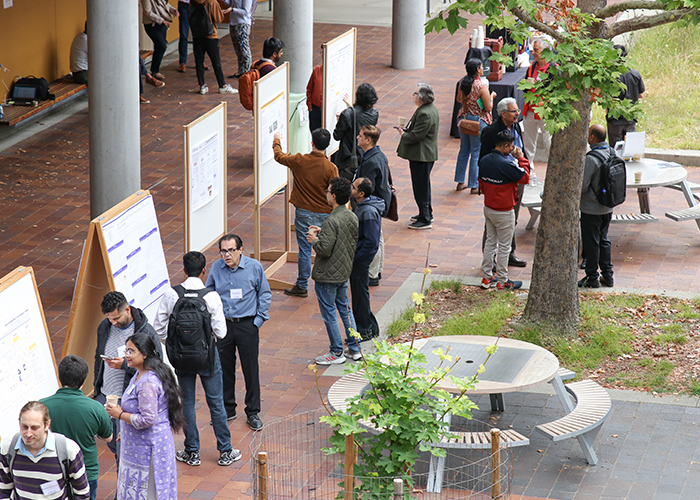Campus News
Exploring new research frontiers with top Indian universities through joint symposium
From July 14–17, UC Santa Cruz hosted a joint research symposium with IIT Delhi and IIT Kanpur on AI, ML, and Cybersecurity. The event highlighted advanced research and opportunities for international collaboration and research.



On the heels of the Chancellor’s visit to India in December of last year, UC Santa Cruz hosted a joint research symposium with the Indian Institute of Technology Delhi (IITD) and the Indian Institute of Technology Kanpur (IITK) from July 14–17. The event was designed to deepen existing institutional partnerships and facilitate new connections between faculty and graduate students with shared research interests around the topics of Artificial Intelligence (AI), Machine Learning (ML), and Cybersecurity – areas of shared national strategic interest that were highlighted by President Biden and Prime Minister Modi in their June 2023 Joint Statement as priorities for increased international collaboration and joint research.
Dean of the Baskin School of Engineering Alexander Wolf kicked off the symposium by sharing goals and intended outcomes to set the stage for a productive gathering. Following general introductions, UC Santa Cruz faculty and graduate students held a poster session in the Baskin Engineering Courtyard where faculty from all institutions engaged in illuminating discussions. Faculty from IITD and IITK finished day one by showcasing their research through in-depth presentations on robotics, privacy enhancing technology, medical image analysis, and more.
“The visit by IIT engineering faculty to UCSC’s Baskin School of Engineering has been tremendously fruitful, identifying common research interests in cybersecurity and artificial intelligence, and laying the groundwork for promising, deep collaborations,” said Wolf. “This visit follows upon one that I was privileged to lead earlier this year in which a delegation of Baskin Engineering faculty traveled to several institutions across India for intensive discussions with like-minded colleagues, advancing our long-standing shared commitment to building robust global academic partnerships.”
On day two, UC Santa Cruz Director of Research Development Molly McCarthy initiated the morning session in which symposium participants heard from representatives from each institution about potential government and institutional funding opportunities that could support their collaborative research as well as several opportunities for faculty and student mobility between India and the U.S.
“The symposium was engaging and convivial. It was great to greet many faculty members whom I first met on our trip to India in April,” said Professor of Computer Science and Engineering Roberto Manduchi. “Discussions were constructive and there was a genuine effort to create sustained collaborations. I am expecting that the symposium will generate several such collaborations.”
Following the morning session and networking lunch, participants moved on to in-depth round table discussions about generative AI and cybersecurity to identify concrete next steps for research collaboration. Participants ended the day with some free time to visit labs, conduct individual follow up meetings with faculty and students, and explore the beautiful UC Santa Cruz campus.
“Through rich discussions and inspiring lab visits with the students and faculty at UCSC, the seeds for deep relationships have been planted,” said Assistant Professor of Electrical Engineering at IITK Tushar Sandhan. “It’s only a matter of time before these seeds will grow into strong, deep roots.”
To wrap up the symposium, faculty from IITD, IITK, and UC Santa Cruz traveled to the UC Santa Cruz Silicon Valley Campus on the third day to engage in panel discussions with expert researchers from each university to explore cybersecurity and the responsible and ethical applications of AI. UC Santa Cruz Associate Professor of Computer Science and Engineering Ian Lane hosted a fireside chat with Dr. Francisco Guzman from Meta, who shared lessons from scaling “No Language Left Behind,” a breakthrough AI project that is capable of translating 200 languages, including low-resource languages.
“The challenges in AI, cybersecurity, and related areas are critical to the economic prosperity of our countries and will be advanced by collaboration,” said Campus Provost and Executive Vice Chancellor Lori Kletzer in her remarks on the final day of the symposium. “The time is ripe for new approaches to research in the areas that were addressed during the three-day symposium.”